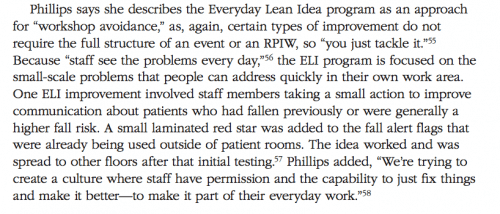It might only be free (brief registration required) for a limited time, but there's a great video of Dr. Kaplan (with his slides) talking about Lean and the challenges facing healthcare (content no longer available for free).
In his introductory comments, Dr. Kaplan talks about the importance of morale (or the scale of the problem in our current state across healthcare):
After introducing problems about quality, access, and cost, Dr. Kaplan said:
Perhaps the most significant issue, in many ways, is the morale of our workforce.
He added:
Physicians are retiring in their mid 50s out of frustration, as “this is not what they signed up for.”
The reason?
The reason is we're asking our people to work in environments of chaos and environments that are full of waste… environments that conspire against them and prevent them from doing their very best work. And that's not what we want to be about.
Part of the power of Kaizen, as an improvement methodology and management philosophy, is that the initial focus is on the MORALE of staff (as taught to us by Massaki Imai). Helping people fix those systems that conspire against them leads to better quality and efficiency… but the improvements (and the engagement) lead to better morale… which leads to better patient satisfaction and better results.
Kaizen is important to Virginia Mason Medical Center. VMMC is well known for their weeklong “Rapid Process Improvement Workshops,” but they also try to practice Kaizen daily – smaller, more gradual improvements, something we wrote about in Healthcare Kaizen, specifically quoting and citing VMMC.
Here are two small excerpts:
and
Be sure to check out his talk. Other resources:
- The book about their Lean journey at VMMC: Transforming Health Care: Virginia Mason Medical Center's Pursuit of the Perfect Patient Experience
- An interview with Dr. Kaplan (via LeanROI.org)
- Blog post about a CBS News story on Virginia Mason (video might not be available any more, but I took notes)
Please scroll down (or click) to post a comment. Connect with me on LinkedIn.
Let’s work together to build a culture of continuous improvement and psychological safety. If you're a leader looking to create lasting change—not just projects—I help organizations:
- Engage people at all levels in sustainable improvement
- Shift from fear of mistakes to learning from them
- Apply Lean thinking in practical, people-centered ways
Interested in coaching or a keynote talk? Let’s start a conversation.












One reason morale suffers is because of mixed messages from leadership where they philosophize about the virtues of continuous improvement but then demand immediate and sizable benefits.
Yes, that would be demoralizing. I’m not sure if that was a veiled criticism of Dr. Kaplan or not.
Not at all. It’s just a bigger issue in my org and probably others where the organization hasn’t dumped old habits yet. I’m guessing this isn’t an issue at all at VM.
I wish more companies thought about continuous improvement this way. When management listens and pays attention to front line staff members, it shows they care and builds empowerment. However, management must stand behind improvements and changes suggested by the front line staff in order to maintain that morale. One of my current projects is with an organization that has never used continuous improvement before – it’s refreshing to see the energy of the participants in these early stages but it is still the duty of the next level managers to maintain this communication and spirit of listening so the projects don’t fall flat.
The principles of kaizen are pretty simple… but having sustained, consistent leadership support and focus are more difficult to maintain over time.